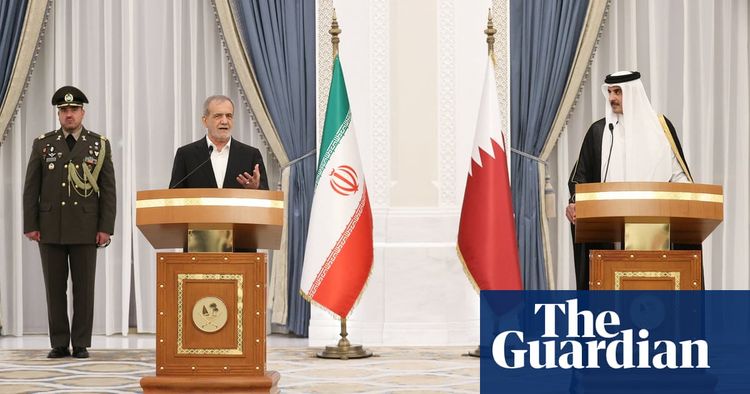Gulf leaders support Palestine – but many would not mind seeing Israel challenge Iran

The unexpected timing of an emergency meeting of Gulf foreign ministers in Doha, coinciding with a visit from Iranian President Masoud Pezeshkian to discuss matters with Qatar’s emir, prompts speculation about the Gulf states' response if Israel decides to pursue its strategy of not only diminishing Iran's influence but also reshaping the Middle East.
The Sunni alliance of six Gulf monarchies isn't particularly friendly towards Iran or its Shia allies, and it only designated Hezbollah as a terrorist group in 2016. However, they are also against any further escalation from Israel, feeling that ultimately, it is only the United States that can rein in Israeli Prime Minister Benjamin Netanyahu.
They argue that creating a separate Palestinian state is the sole way to achieve stability, unity, and prosperity in the region.
In a piece for the Financial Times on Wednesday, Saudi Foreign Minister Prince Faisal bin Farhan emphasized that establishing Palestinian statehood is essential for achieving peace, rather than a result of it. He did not mention the conflict between Israel and Iran, nor did he speculate on the chance that President Joe Biden, nearing the end of his presidency and just a month away from an election, would pressure Israel.
In reality, leaders of Gulf states, even with the backing of their citizens for the Palestinian cause, are not expected to alter their long-standing approach. This approach has primarily involved offering only humanitarian assistance and political backing to the Palestinians, without any significant changes.
Situations can evolve rapidly, but right now, Israel is poised for a comeback, aiming to break the deadlock in Gaza. Their goal is to dismantle Hezbollah's military command and weaken Iran to the point where it won't pose any threat to Israel in the future.
The possibility that Israel might target Iran's oil facilities, not just its nuclear sites, is likely to alarm the Gulf Cooperation Council (GCC). An Arab diplomat, who is not an ally of Iran, expressed concern about the ethical consequences of Israel achieving a complete victory. He remarked that it would leave a harsh message in the Middle East: that "justice" can be achieved through total warfare.
The Gulf Cooperation Council (GCC), led by Qatar's Prime Minister Sheikh Mohammed bin Abdulrahman bin Jassim Al Thani, insists that a ceasefire between Hamas and Israel is the key to resolving the current crisis. However, Israel’s recent assassination of Ismail Haniyeh, a crucial figure for Qatar in its negotiations with Hamas, dealt a significant setback to Doha’s efforts to facilitate this ceasefire.
Similarly, regarding Lebanon, the GCC countries—Kuwait, Oman, Saudi Arabia, Qatar, and the United Arab Emirates—have called on Israel to honor Lebanon's sovereignty and agree to a ceasefire. However, they have not supported Iran's aggression towards Israel.
If Israel keeps gaining strength, the Gulf and Arab countries could find themselves in a tricky situation. On one side, a sustained decline in Iranian power might lead to an unsettling gap in the region, where only Israel’s dominance prevails. Conversely, this could also be a chance for these regional nations to take advantage of Iran’s weakened position and counteract the influence of Iranian-supported non-state groups.
Several neighboring countries have a vested interest in seeing Iran's power reduced. A less influential Iran could allow Iraq's president, Mohammed Shia al-Sudani, to exert more control over groups that are backed by Iran. Meanwhile, Syria's president, Bashar al-Assad, who has notably refrained from commenting on the ongoing conflict despite Hezbollah’s backing, might regain some leverage in Lebanon.
Jordan is influenced by the Islamic Action Front, a branch of the Muslim Brotherhood that performed well in the latest parliamentary elections, securing 28% of the votes and emerging as the largest party. The country has at times accused Iran of attempting to incite factions that oppose it.
Bahrain, which established diplomatic ties with Israel in 2020 alongside the United Arab Emirates, frequently faces pro-Palestinian protests. LuaLua TV, a channel supportive of Iran, reports that there have been Shia demonstrations to mourn the passing of Hassan Nasrallah.
Kuwait is engaged in a prolonged rivalry with Iran over the extraction of natural gas from a disputed offshore gas field.
However, the most important relationship in the region is between Iran and Saudi Arabia. This connection was improved following the de-escalation plan that was established in 2023 through discussions in Beijing.
Saudi Arabia welcomed the Iranian president for the first time in over a decade and permitted Iranian pilgrims to visit the sacred cities of Mecca and Medina. Riyadh has renewed its ties with Syria, which is backed by Iran, and is optimistic that it has gained Iranian backing to stop the Houthi forces in Yemen from launching missiles into Saudi territory.
Riyadh has made it clear to the US on numerous occasions that it has no interest in normalizing relations with Israel unless there is a viable plan for a two-state solution. Netanyahu's recent speech at the UN, where he urged Saudi Arabia to join the UAE in establishing ties with Israel, ignored this stance and overlooked his own role as a barrier to reaching such an agreement.
In a recent report released by the European Council on Foreign Relations, the writers emphasize that the relationship between Saudi Arabia and Iran plays a vital role in ensuring peace.
They argue that a strategy aiming to completely exclude Tehran from the regional security framework will lack support from neighboring countries and will ultimately backfire.























































